Text
hahaha, There's A TTRPG For That!
Not a full list because I don't have the time. Just gonna link you to my Space Opera Post, my Space Western post, See You Space Cowboy, and Dead Belt.
I'm looking for a new game to dive into.
Something star-wars-y or cowboy-bebop-y. You know, "the motley crew of a ship going on adventures with some level of space magic to make things interesting." Something I can sink my teeth into. Any recommendations?
74 notes
·
View notes
Text
TTRPGs As Terrariums For Blorbos
One thing that I think isn't covered enough in TTRPG recommendations is styles of play.
There's a lot of "this game has this tone," or "this game is this amount of crunchy," but less "what are you playing towards?"
In games like Microscope and I'm Sorry Did You Say Street Magic? and The Quiet Year, you're playing to see what happens to the setting.
In games like Mork Borg and Into The Odd and Mothership, you're playing to see how far your character can get.
And in a lot of games, you're playing to create a blorbo, an OC, just a little guy, and the soul of the gameplay is the story of who your guy is and who your guy becomes.
This is blorbo style play.
And the thing about styles of play is that you can apply them to any game, even games that aren't really built to enable them. So I wanted to take a moment to shine a spotlight onto some games that do specifically enable you to fully blorb out. (I'll try to cover a mix of genres and tones, but the rpg scene is vast so if you have a favorite that I missed please feel free to shout it out in the replies.)
-Golden Sky Stories. This is the English translation of the Japanese TTRPG Yuuyake Koyake. You play as shapeshifter kids and spirits in a small town and, instead of tracking EXP, the thing that you carry from session to session is your relationships with other characters. The tone of the game is heartwarming, and if combat happens, both sides lose. There can be emotional turmoil, but this isn't a game where you have to worry about bad things happening to your blorbo.
-New World Of Darkness. On the other hand, let's say you *want* bad things to happen to your blorbo. You want to play a guy that's really going through it. If you also like modern supernatural stories, New World Of Darkness was built for you. Characters in NWoD can be entirely non-combat, or a literal werewolf, or a noncombat werewolf. The game places a lot of emphasis on navigating through the setting socially, as its supernatural creatures tend to run in factions and starting a fight usually means making a bunch of enemies.
-Pasion De Las Pasiones. Of course, not everyone wants a fantastical setting. Sometimes good old melodrama is hearty and comforting. Pasion De Las Pasiones is a playable telenovela, and it encourages you to play your characters bold and recklessly. Every class even has a built-in Meltdown, where if you're pushed to the edge they become extra reckless, ensuring a broad fallout of messy drama when they do manage to calm down.
-Cortex System / Unisystem. Perhaps you want to drop your blorbo into an existing fictional universe? But you also want stats and meaty character creation instead of just freeform roleplay? There are easily a dozen games on the Cortex engine, including Supernatural, Firefly, Smallville, Battlestar Galactica, Marvel, and Leverage. And on Unisystem, there's Buffy, Army Of Darkness, as well as a somewhat rare I Can't Believe It's Not Planet Of The Apes.
-Lancer / Gubat Banwa. If you like blorb-y play but still want a heavy side of combat, both of these games have you covered. Lancer has a sprawling scifi universe focused on mech pilots, and Gubat Banwa has a violent and lavish mythological Philippines setting. Both of these games also have stunningly beautiful artwork, so if you like seeing a setting visually come to life, these are for you.
-Fabula Ultima. My final recommendation is also an extremely gorgeous looking game. Fabula Ultima is built on the bones of Ryuutama (itself an excellent travel-fantasy game) to enable meaty, blorby Final Fantasy style campaign play. Combat is a rich and deep option in Fabula Ultima, but so is everything from spellcasting to crafting, and players have built-in resources they can spend to affect the story. If a scene isn't quite going the way you want it to, you can spend a point to nudge it in the right direction. Fabula Ultima also feels extremely complete without being too complicated.
So there you go. Eight options, and that's barely scratching the surface of the sea of blorb-y games (Seventh Sea, Exalted, Blue Rose, Legend Of The Five Rings, Coyote And Crow, Timewatch, Nahual, and more!)
It's also not wrong to play non-blorb-y games in a blorb-y way. Do whatever you're comfortable with! But you might enjoy dipping into these titles.
Finally, if you've read this far and you're somehow still looking for MORE recommendations, I wrote this game about runaway changelings trying to find their place in the world, and it's probably the blorbiest in my catalog.
456 notes
·
View notes
Note
Hi! I just wanted to say thanks for reblogging one my posts about my Mech Game-- you've driven some traffic to me and I appreciate it! Hope you have a great day.
Hi! I'm glad your game found folks who were interested in it! There's such a big love for mech games.
8 notes
·
View notes
Text
Show Questions from the Storyteller Conclave Episode on Eureka: Investigative Urban Fantasy
During the show we were on, which you can listen to here, here, here, or here, we didn't have time to get to all of the audience questions on-air, so @ashweather and I went and answered them in the discord server.
Here they are.
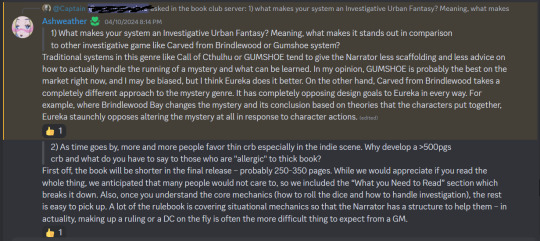
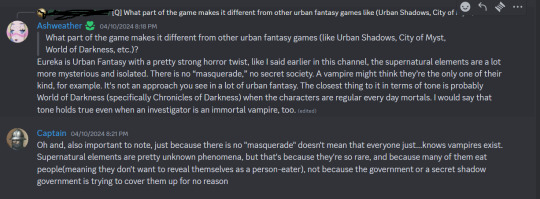
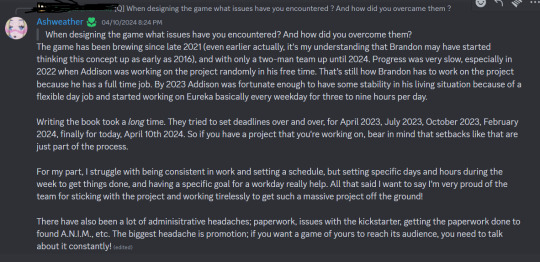
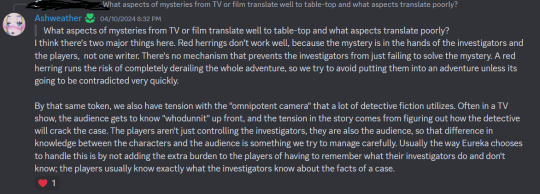
Remember, the kickstarter is still funding until May 10th! We need your help to hit those stretch goals! Tell your friends!
youtube
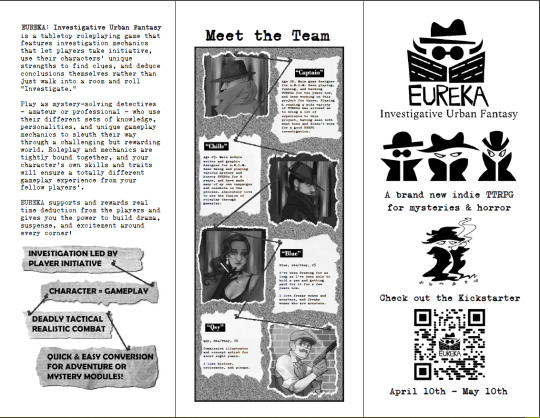
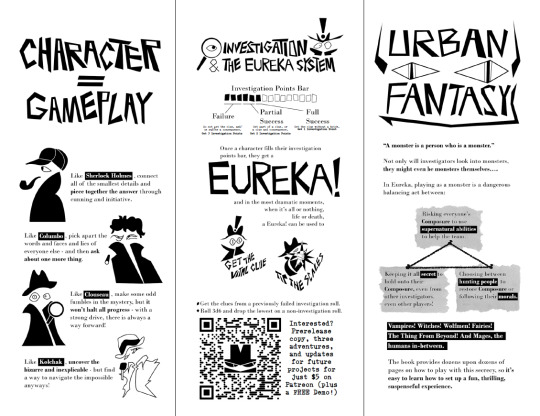
If you want to try before you buy, you can download a free demo of the prerelease version from our website or our itch.io page!
If you’re interested in a more updated and improved version of Eureka: Investigative Urban Fantasy than the free demo you got from our website, subscribe to our Patreon where we frequently roll our new updates for the prerelease version!
You can also support us on Ko-fi, or by checking out our merchandise!
Join our TTRPG Book Club At the time of writng this, Eureka: Investigative Urban Fantasy is the current game being played in the book club, and anyone who wants to participate in discussion, but can’t afford to make a contribution, will be given the most updated prerelease version for free! Plus it’s just a great place to discuss and play new TTRPGs you might not be able to otherwise!
We hope to see you there, and that you will help our dreams come true and launch our careers as indie TTRPG developers with a bang by getting us to our base goal and blowing those stretch goals out of the water, and fight back against WotC's monopoly on the entire hobby. Wish us luck.

51 notes
·
View notes
Text
Brinkwood Google Sheets 2.0
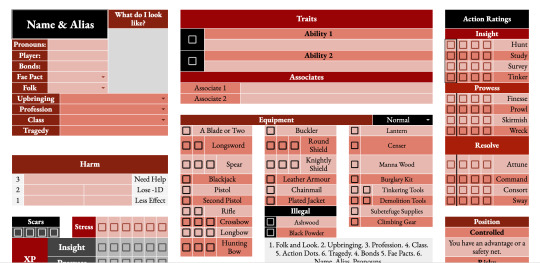
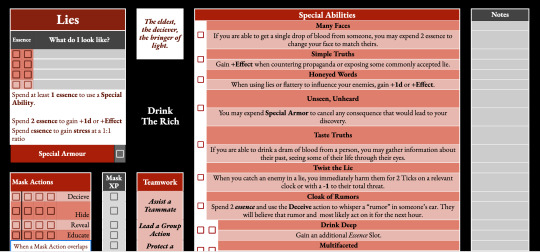
Hello folks! I'm going through the updates for a number of my older google sheets, and I've just finished a complete overhaul of Brinkwood: Blood of Tyrants, a Forged-in-the-Dark game about fae-sponsored peasants fighting vampires. It's Castlevania meets Robin Hood in the best way.
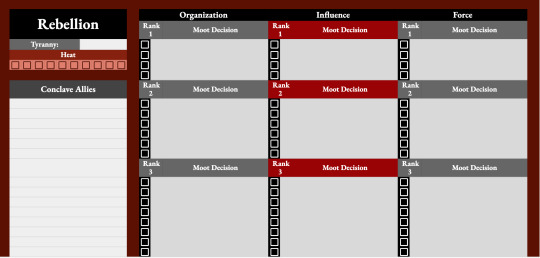
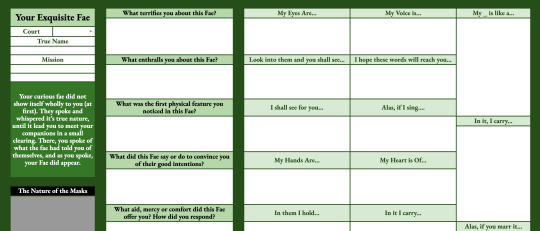
Y'all, this is a monster of a playkit. I have a Brigand Template that you can copy and paste for each player, the 7 Masks as well as Mask template so you can create your own, a Rebellion tracking sheet with info about Bans and Scars, and a sheet to help you build your own Exquisite Fae!
There's also my updated Safety Tools sheet, with Lines, Veils & Lures, CATS, and a short run-down of common safety tools.
I'll be retiring my old Brinkwood playkit, but you can pick up the new one here! You can also see my full library of playkits, which I'm slowly updating, by clicking on the link below.
Clicky.
33 notes
·
View notes
Note
Thanks so much for doing all this, I love what you do for enjoyers of ttrpgs!!
What I'm looking for is epistolary or long-distance, asynchronous games for multiple players. I know you've done lists of 2-player games that people can play in their own time (writing letters or journal entries back and forth, stating your actions in a message then waiting for the other player, etc) but I was wondering if there were any I could play with 3 or more players with different timezones & schedules at once.
Genre and playstyle are flexible, we love trying new mechanics! I've struggled to find games to fit this myself, so I hope you can have a little more luck. You're awesome for taking these requests and finding so many different games for people!
THEME: Asynch & Epistolary for 3 or More.
Hello friend! First of all, I’m going to send you to my Epistolary (Part 3) post because that was specifically for 3 or more players, as well as my first epistolary post because there were a number there that could also be played with a number of people.
But don't worry, there's more!

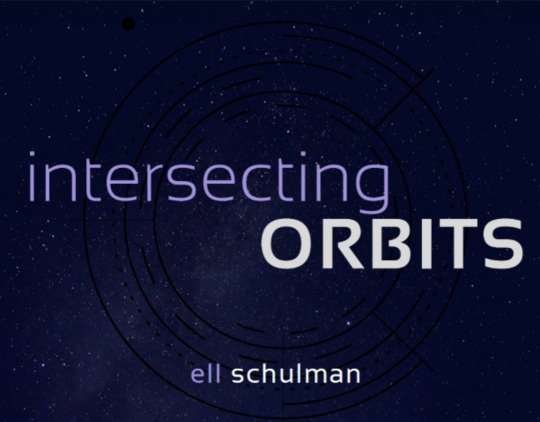


Angels of the Railway Stations, by Speak the Sky.
There’s only so much you can do alone, but you’re not alone. There’s only so much that can be done with any one meeting, but life is more than one meeting. As you go through the stages of Arrival, Stopover, and Departure, take notes of everything in the form of a letter to be sent on with the train when it leaves the station. These letters should give your fellow angels more context to help the traveller in need along the way. They’re also your only way to communicate with your colleagues and comrades.
Angels of the Railway Stations is an epistolary game for 2+ players in which you play a liminal community of lonely angels. Help lonely travellers in a world undergoing a great upheaval, then write about what you see and do to pass it on to the next angel down the line.
All of the rules for this game can fit on one page, and require you to rely on other players to determine what each of your passengers need and help them get to where they need to go - on time. Angels of the Railway Station references a game called Black Engines, which does not actually exist, which means that many parts of this game will require your play group to fill in the blanks. That being said, I think Angels of the Railway Station has plenty of potential when it comes to telling emotional stories.
Intersecting Orbits, by Ell Schulman.
For as long as there have been Orbiters, there has been the Interference. Spikes in data that have no business being there, garbled words, ghosts in the machinery. Few people believe truly in the existence of the Interference as an entity.The Interference does not care what they believe.
The planet below is alive. There are deep oceans and high mountains and biomes we do not have names for. There are plants and animals that do not conform to systems we know.
There are people who look up at the stars and wonder who else is out there.There is so much to explore.
Intersecting Orbits is a game for three players, two of whom play Orbiters sending messages back and forth and one of whom plays the Interference who intercepts those messages and removes words from them.
Using a deck of cards, the two Orbiters will try to communicate to each-other about something that is going on. Meanwhile, the Interference uses 2d6 to determine how many words of the message they can remove. You can probably use this method either by sending letters to each-other, or by writing e-mails or sending texts, so I think this game is definitely flexible in terms of how quickly you want to send messages to each-other, and how long you want the game to run.
Chronicle, by a.fell.
The world is coming to an end. It has been foretold, and so it shall be. We cannot stop it; we only wait, and observe, and recall.
This is a game to create a chronicle of a world, and to find the world again in the last seconds of its life. The game is different depending on which path you choose to take.
You will not play together. You might not play at the same time, or in the same place. You might not even know each other before you play this game.
When you play The Chronicler, you will play alone, across time, across worlds. There is foretelling that an end is coming. You are here to ensure that your life, your people, and your world, survive. The Witnesses will find your artifacts an unknowable amount of time later. They will observe, they will wonder, they will remember their own lives, and they will know you. The world they know is empty, and soon they, too, will be gone. But they will carry these moments with them.
Chronicle uses a tarot deck (or something similar) as an oracle, and requires some form of map for the Chronicler to add to. The Chronicler will draw from this deck to create the events, artifacts and messages from this world. Most of the Chronicler’s work is done by the time the Witnesses come into play, who will travel across the map, pick up artifacts left behind by the Chronicler, and use their own oracle decks to recall personal memories. Eventually, a cataclysm will fall, and the game will end.
Leaving Cambridge, by Nora Katz.
You were together once, a lifetime ago, in a place called Cambridge. It was a place you held dear—a place that you called home, even if just for a moment. But something strange or sinister happened, and now you are all gone, dispersed across countries, continents, and maybe even worlds. There are stories untold and things unsaid. This is your chance to say them.
“Leaving Cambridge” is an intimate, asynchronous storytelling game that takes place through letters exchanged between a group of people who have parted ways. Over the course of a real-life calendar year, a group of players write letters to each other, piecing together what happened to them, trying to reconcile their checkered pasts with their current realities. As the letters arrive, this group of people will come to understand each other, and themselves, with more clarity—and, most likely, more questions.
Leaving Cambridge is a setting-agnostic game, so you can set it at any time period and any technology level, as long as it is possible that all of the players at some point went to Cambridge together.. What remains true is that you were once friends, but you have since grown apart. You will draw from a deck of cards, with red cards reflecting memories you share and black cards representing your emotions. Writing will happen over four seasons, with an inciting reason for you to get back in touch with each-other, and generative prompts that encourage your characters to reveal pieces of themselves the longer that they write.
I’d Also Recommend…
When I Lived Here, by a grumpy little critter.
37 notes
·
View notes
Text
More random tropes that I fucking love: Becoming the mask you wore.
Like oh shit, this character who was sent to spy somewhere under a false identity suddenly realises they've started to genuinely become the person they claimed to be? Someone who's been telling the same lies about who they are for so long that they're actually forgetting that the story isn't true? Finding themselves genuinely doing the things they pretend to do in front of people, when they're alone and nobody's watching? Answering to a name that wasn't supposed to be theirs without thinking?
Ooohh-hoh-hoh, you lost track of yourself in pretending to be someone else? You were only supposed to impersonate somebody, a plausible background and a name you came up with on the spot, and now that the people you were supposed to infiltrate have become your true companions? You lost yourself in the game you played, and no you no longer know who you truly are, and where your true loyalties lie? And both sides would mark you a traitor if you came out with the truth. On a scale of one to ten, how bad did you fuck up.
Fuck that is a good trope. Never seen it done badly. Pour that shit on a table and I'll chop it into lines and snort it.
43K notes
·
View notes
Text
IMMORTAL POP!BAT 2: funK.O. (DEFINITIVE EDITION)
THIRTEEN THOUSAND SEVEN HUNDRED AND NINETY NINE UNIQUE FUNKO POP STATBLOCKS
ONE THOUSAND SIX HUNDRED AND TWENTY PAGES
COWER BEFORE ME
152 notes
·
View notes
Text
A huge portion of the mech game is managing your mech’s heat in combat. It goes up every turn, but goes down when as you’re thrown through the air by explosions and boosters. Too much heat, and your parts start igniting. They usually still function, but the debuffs stack quickly…

39 notes
·
View notes
Text
Now at IPR: SMORKAS BORG A Kobolds Ate My Baby + Mork Borg crossover!
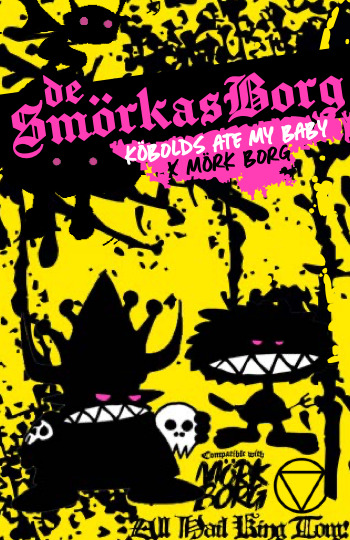
A Kobolds Ate My Baby and Mork Borg crossover roleplaying game.
Kobolds are fearless (and hungry). But in the deepest and darkest depths of teh cave, the less stupid prophets of vore speak of the coming of the end. The end of the road, one for the ditch! Eventually, someone has to pay the bill for this endless buffet that kobolds call life.
https://www.indiepressrevolution.com/xcart/SMORKAS-BORG-A-Kobolds-Ate-My-Baby-Mork-Borg-crossover-Print-PDF.html
29 notes
·
View notes
Text
Rotted Capes Spreadsheets 2.0
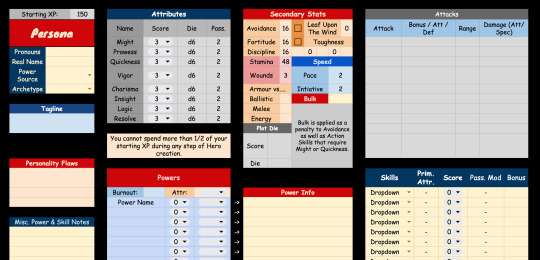
Another character sheet updated, another character sheet with a new link! Rotted Capes is a game about super-heroes, zombies, and super-zombies. The golden of super-heroes is dead, and the age of the undead is rising. You are what's left of the super-powered: the sidekicks, low-level heroes and former villains, and the remains of humanity looks to you.
This character sheets has a Safety Tools sheets, as per usual, and then a Character Template that can be copied for multiple characters. There's a lot of drop-down tables and inter-connected cells going on here, since there's a lot of math when it comes to calculating secondary stats. As it stands, right now much of that math should be easier to do!
You can check out the new-and-improved Rotted Capes spreadsheets here, and the entire library of my spreadsheets at the link below.
Clicky.
12 notes
·
View notes
Text
Investigators’ Truth in Eureka: Investigative Urban Fantasy
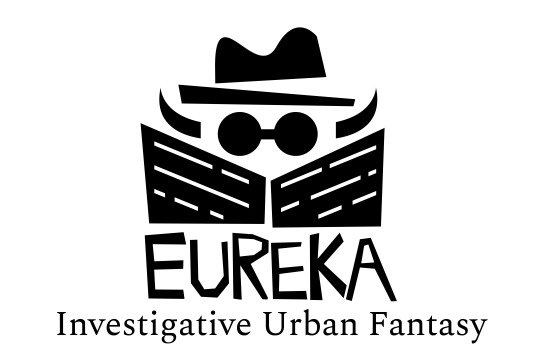
We have mentioned before on this blog when talking about Eureka: Investigative Urban Fantasy that in Eureka roleplay is mechanics-driven and mechanics are roleplay-driven, but what does that mean?
The short version is that when making your PC, you put things on their character sheet that give bonuses when they act in a way that is consistent with their intended characterization.
One of these elements is called a character’s Truth. Every Eureka PC has a Truth, and they may even have multiple Truths. A Truth can even change as a result of events in the campaign.
A character’s Truth is some strong element of their personality or beliefs that is likely to spur them into action, get them into trouble, or both. It is not necessarily a flaw, but it easily can be, as one of the main purposes of it is to encourage and reward players for letting their characters screw up.
When playing a video game or a TTRPG, it’s often very easy to sit back and think out every problem and approach them perfectly logically, especially when time usually pauses as you discuss the next move among the other players at the table. But if every character in a movie or book or any other story always made the most perfectly logical decision, that would probably be a pretty boring story, and it certainly wouldn’t be a very realistic story. People don't always make the most logical decisions in real life.
However, when playing a game, it can feel like “losing” to intentionally make a character make a decision that you, in your logical detached mind, know will probably not work out well for them in the long run. Eureka argues that this is not “losing”, and that this is actually exactly how Eureka is supposed to go. To encourage this, we added the Truth mechanic.
Like I said before, Truth is not exactly a flaw, just some part of the character’s personality or beliefs that would spur them to action or get them into trouble. It could be a hot temper, a need to always have the last word, an overly competitive nature, a love of violence, or a compulsion to lie, but it could also be a strong desire to selflessly protect others, or the trust that one’s fellow man are inherently good.
Whatever it is, when a character acts within the parameters of their Truth, they get a +1 to the dice roll for whatever it is they’re doing, or whatever dice roll results from them acting in their Truth.
This doesn’t mean that a character acting within their Truth is always the worst course of action on their part, sometimes emotional gut decisions do turn out to be right. Maybe a character whose Truth is somehow based around trusting others is right to lower their weapon, because the monster might be just as scared of them as they are of him, and that +1 Truth Bonus is going to come in handy in the resulting Comfort roll to try and de-escalate the situation—or maybe they’re completely wrong and the monster was just waiting for an opportunity to seize the upper hand, and that +1 Truth Bonus is instead going to be used on an Athletics roll to run like hell.
This also doesn’t mean that a character always has to act within their Truth, no one realistically reacts the exact same way to every situation, and we do not encourage GMs to push or punish players if their characters do not act within their Truth, but Truth helps reward realistic, in-character behavior from the PCs.
In this way, the rules/mechanics of Eureka: Investigative Urban Fantasy are tied directly to the roleplay of the character, and the roleplay of the character is encouraged and supported by the rules/mechanics.
Stay tuned for another post about a way that in-character roleplay and rules/mechanics are intertwined with the Traits system.

You can also pick up a pre-release PDF copy of this game(in a fully playable state) for $5 through our Patreon.
129 notes
·
View notes
Text
I am so excited about the new glazes I picked up recently! Here's a sneak peek at what will be available on May 20th 👐
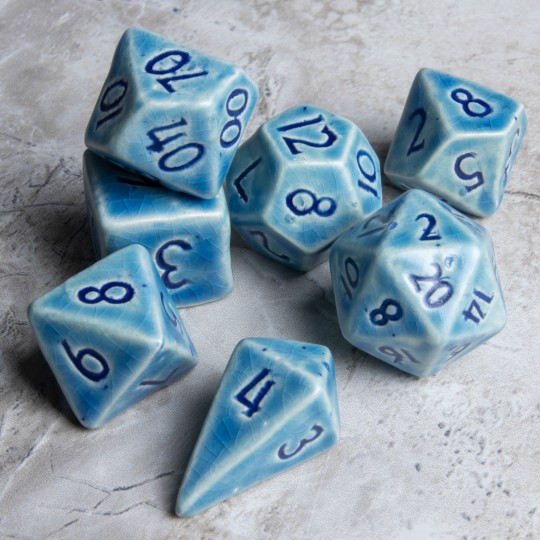
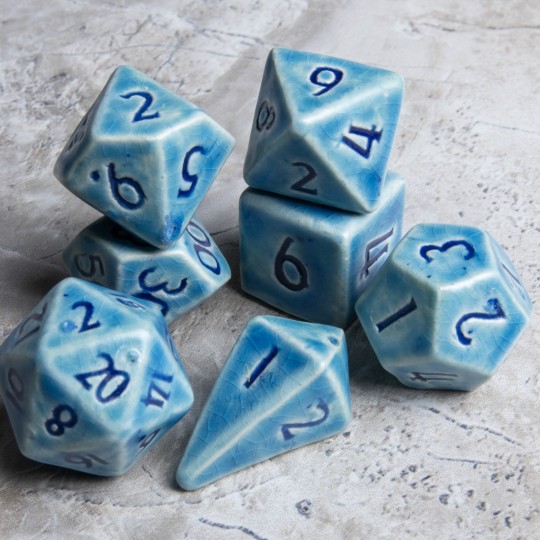
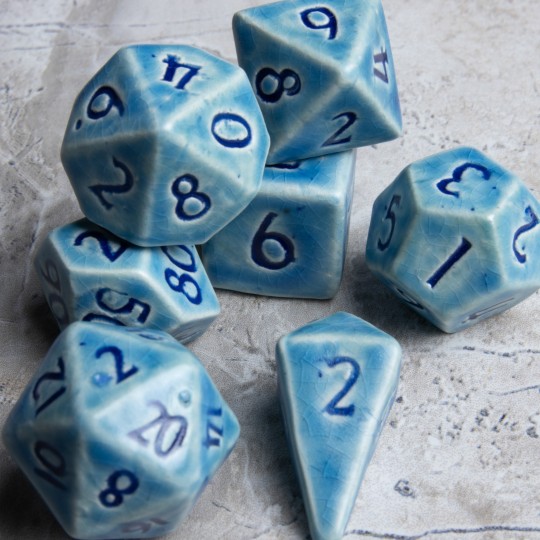
126 notes
·
View notes
Text
Non-Violent Adventurous TTRPGS
Today is ANZAC day in Aotearoa New Zealand. It seems a very appropriate time to share some games about helping and healing.
Monster Care Squad by Sandy Pug Games
A game about nurturing monsters and healing them of their pain. In the creator's own words, you play a squad of elite veterinarians. I love games that make you feel you're making a positive difference. I hope to play this one some time.
Ngen Mapu by Helena Real and Evil Hat Productions
This game's gorgeous art is what first caught my eye, but what really drew me in was the premise. Playing as manifested spirits from the dawn of time, you must stop people who are causing serious harm to the natural world without hurting them. What happens if you hurt them? Well, you risk becoming a corrupted ngen called a wekufe.
Wanderhome by Jay Dragon of Possum Creek Games
A game of wandering animal folk. Wanderhome has been on my 'to buy' list since its release. This review sums up a lot of why I love it. The grief and hope of a game that takes place in a world recovering from war appeals to me far more than a game about fighting a war. Plus, my favourite part of roleplaying is exploring a character's internal world, and there are so many chances for that here.
Lunar Echoes is a hack of Wanderhome set in a solarpunk future!
80 notes
·
View notes
Text


Had the pleasure of working with @ratwavegamehouse to design the cover for her upcoming game Psychodungeon
28 notes
·
View notes
Text
Have you played A Loud Noise In A Quiet Place ?
By Marx Sheperd
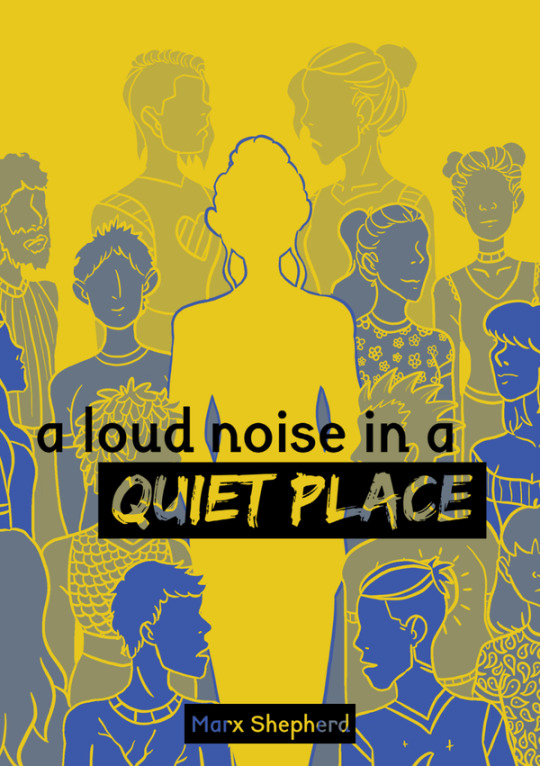
a loud noise in a quiet place is a story game for one or two players about temporary hearing loss.
35 notes
·
View notes
Note
What ttrpg did you start with? Have you always been in a "GM" role or did that come later?
so i was invited to play d&d 4th edition with some LARP friends when i was taking a gap year off from college, i was some kind of chain-cleric (invoker?). i had been looking at ttrpgs for a while, stuff like chuubo's marvelous wish-granting engine, because of its crossover applications in my LARP design. shortly afterwards i started running monsterhearts and savage worlds for my friends, and i started running d&d 5e when i got back to college
i was pretty quickly a GM! i struggle a lot with being a player in a game with traditional gm/player separations, because i get easily distracted and tune out when i dont have much control over the setting or broader world. even when im a player i tend to play in a very GMish style
46 notes
·
View notes